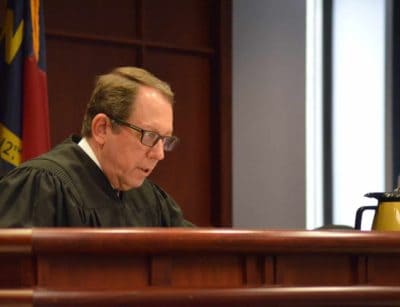

Editor’s Note: EducationNC is offering an opportunity for superintendents and principals to weigh in between the time of publication and 9 a.m. on Nov. 10. The article will be updated as comments come in.
With many anticipating some sort of budget reveal next week, education leaders have spent this week reaching out to legislative leaders and the governor urging them to compromise.
Yesterday, it was state Superintendent Catherine Truitt, and now it’s the leaders of three statewide organizations representing school and district leaders.
“North Carolina’s public schools stand on the brink of crisis as they face a fourth month in this fiscal year and nearly four full years without a comprehensive state budget. Staffing shortages in all ranks of school personnel are worsening as employees receive pay not competitive with what they could earn in the private sector or in neighboring states,” the letter from education leaders stated.
The letter is directed to Democratic Governor Roy Cooper, House Speaker Tim Moore, R-Cleveland, and Senate President Pro Tempore Phil Berger, R-Rockingham. It is from the heads of the North Carolina Principals and Assistant Principals Association, the North Carolina Association of School Administrators, and the North Carolina School Superintendents’ Association.
The letter goes on to urge state leaders to find “common ground” on a number of “key issues,” including educator compensation, student mental health, and school funding. It also mentions funding the first two years of the Leandro recommendations. A hearing is scheduled for Wednesday, Nov. 10 in the Leandro case.
“For North Carolina to be the education leader it can and should be, we first need your leadership and agreement to provide robust support to our public education system,” the letter states.
The state has been operating since July 2019 on a continuation budget amended by some mini-budgets passed by lawmakers. Under the continuation budget, $9,987,410,026 was authorized in public education spending for fiscal year 2020-21. The state is sitting on more than $8.6 billion as of September that can’t be allocated until there is a budget.
The House and Senate passed their budget proposals earlier this session, and Cooper presented his plan even before that, but the three have, thus far, been unable to reach a compromise that would avoid a gubernatorial veto.
Read the letter:
The letter Tuesday comes on the back of one sent Monday by Truitt. In that letter to the governor and legislative leaders, she also laid out the problems caused by a lack of a budget, including impending “crises” in a number of areas overseen by the state Department of Public Instruction.
In her letter, Truitt also said that if a compromise isn’t possible, lawmakers should be allowed to vote their conscience without pressure. Republicans have the votes to pass a budget but will need the help of Democrats to sustain an override of a veto from Cooper if he chooses to strike down the budget proposal.
Read Truitt’s letter:
Jeff McDaris, superintendent of Transylvania County Schools:
“I believe everyone knows we are at a critical fork in North Carolina. One way is the road well-traveled and worn. But they are the tracks that simply circle the wood. It is known and seems safe and comfortable. It saves money. You keep the same dollar bill that never really multiplies. It largely leads to the same well-aged destination. Like the dusty path to the Mayan ruins, we see the once great buildings. But all the people are gone.
“Then there is the new fork. It requires talented, well cared for, respected, and well-prepared artisans and support staff. It requires resolute leaders and leadership. There are exciting unknowns for a changing world that can only be met head-on by the investment in the vital educational framework of people and infrastructure. That road leads to a necessary new normal that moves our great state forward and out of the stagnant circle. It takes investment to create success. We need a budget now and one that moves us forward. We can afford it. We can’t afford another stalemate that leaves only ruins in the jungle.”
Rhonda Schuhler, superintendent of Franklin County Schools:
“During what has been an unprecedented time in North Carolina, our public schools have acted as a hub for community resources, providing meals, creating artificial infrastructure for wifi through use of hotspots and internet hubs in communities where access is lacking, modifying instructional delivery methods to respond to various stages of the pandemic, and offering social and emotional support to assist students and families as they grapple with these challenges. School staff are stretched thin, and the complexity of the work that is necessary to meet the needs of our students has been compounded over the past twenty months.
“We need our state leaders to come together and demonstrate a level of bipartisanship and compromise to ensure that our most precious resource — each of our children — are provided with the very best educational opportunity so that they can become our future workers and leaders, laying the foundation for our long-term success as a state. This collective response in support of public schools is important now more than ever.”
Scott Elliott, superintendent of Watauga County Schools:
“Right now our state level education governance is dysfunctional, and one need look no further than the state budget stalemate as proof. State leaders, even within the same party, cannot agree on a vision for public education and how to fund it because to them it is about power and politics rather than about our students and teachers. All of our budgets — local, state, and federal — are all interconnected in how we manage our school budgets, but here we are four months into the school year uncertain as to what we will eventually be able to do or not do.
“Many elected leaders in Raleigh are small business owners, but none of them would budget or run a business this way. There are many elected officials from both parties, many of them former school board members, who know the impact this is having on our schools.”
Rob Jackson, Superintendent of Carteret County Public Schools:
“There is no question in my mind that the children of our great state are worthy of every effort expended on their behalf. Tied up in the delayed budget is funding that represents opportunities for students. One example is meaningful salary increases for teachers and school system staff members that give local districts a powerful tool in recruiting (and equally importantly) retaining high-quality, caring, and dedicated educators who are the biggest factor in student success. It is my hope that our leaders will quickly coalesce around shared priorities and find the compromises necessary to complete the budget process.”
Lori Fox, principal of Haywood Early College in Haywood County:
“We continue to hold out hope that we will have a comprehensive budget soon. That’s what we do. We convey hope to the thousands of students across NC. The very least our state leaders can do is get us the funds to operate efficiently and effectively. We are more than political negotiations. Don’t stalemate our students. Don’t deadlock on our schools. This has the potential to be a turning point across our state. “


